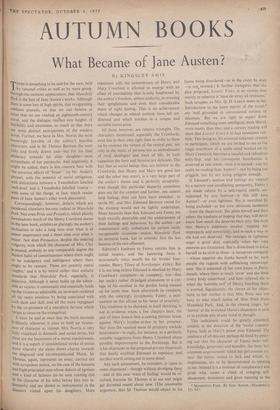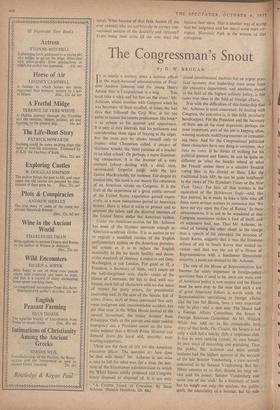AUTUMN BOOKS
What Became of Jane Austen?
By KINGSLEY AMIS THERE is something to be said for the view, held. by rational critics as well as by mere going- through-the-motions appreciators, that Mansfield Park is the best of Jane Austen's works. Although there is some loss of high spirits, that invigorating coldness prevails, so that we can believe at times that we are reading an eighteenth-century novel, and the dialogue reaChes new heights of flexibility and awareness, so much so that there are some distinct anticipations of the modern novel. Further, we have in Mrs. Norris the most hauntingly horrible of the author's horrible characters, and in Sir Thomas Bertram the most fully and firmly drawn and—but for his final Obduracy towards his elder daughter—most sympathetic of her patriarchs. And negatively, it might be added, there is less concern here with the amorous effects of "brass"' (in Mr. Auden's Phrase), with the minutim of social obligation,' With distinctions between a Tweedledum labelled 'well-bred' and a Tweedledee labelled 'coarse'— with some of the things, in fact, which render Parts of Jane Austen's other work distasteful.
• Correspondingly, however, defects , which are Incidental elsewhere become radical in Mansfield Park. IsIbt even Pride and Prejudice, which plainly foreshadows much of the Henry Crawford theme In the later book, exhibits as glaringly the author's Inclination to take a long time over what is of minor importance and a short time over what is major. Nor does Persuasion, despite the sneering vulgarity with which the character of Mrs. Clay IS treated, embody to any comparable degree the Austen habit of censoriousness where there ought to be indulgence and indulgence where there ought to be censure. These are patently moral 'oughts,' and it is by moral rather than testhetic standards that Mansfield Park, especially, is defective. Although it never holds up the admir- able as vicious, it continually ad essentially holds up the vicious as admirable, an inversion rendered all the more insidious by being associated with such dash and skill, and all the more repugnant by the co-presence of a moralistic fervour which verges at times on the evangelical.
It must be said at once that the book succeeds brilliantly whenever it aims to hold up vicious- ness of character as vicious. Mrs. Norris is very fully visualised in domestic and social terms, but these are the lineaments of a moral repulsiveness, and it is a superb if unintentional stroke of moral irony whereby she alone shows charity towards the disgraced and excommunicated Maria. Sir Thomas, again, represents an essay, carried out With scrupulous justice, on the case of the humane and high-principled man whose defects of egotism and a kind of laziness (to be seen running riot in the character of his wife) betray him into in- humanity and are shown as instrumental in the disasters visited upon his daughters. More important still, the unworthiness of Henry and Mary Crawford is allowed to emerge with an effect of inevitability that is only heightened by the author's freedom, almost audacity, in stressing their sprightliness and even their considerable share of right feeling. This is an achievement which changes in ethical outlook have left un- dimmed and which testifies to a unique and enviable moral poise.
All these, however, are relative triumphs. The characters mentioned, especially the Crawfords, exist less in their own right than in order to show up by contrast the virtues of the central pair, not only in the status of persons but as embodiments of rival ideologies and ways of life. In both capacities the hero and heroine are deficient. The fact that as social beings they are inferior to the Crawfords, that Henry and Mary are good fun ahd the other two aren't, is a very large part of the author's theme and is perfectly acceptable, even though this particular disparity sometimes goes too far for comfort and further, one cannot , help feeling, than can have been intended : to invite Mr. and Mrs. Edmund Bertram round for the evening would not be lightly undertaken. More basically than this, Edmund and Fanny are both morally detestable and the endorsement of their feelings and behaviour by the author—an endorsement only withdrawn on certain easily recognisable occasions—makes Mansfield Park an immoral book. Let us consider first the less heinous of the two offenders.
Edmund's kindness to Fanny entitles him to initial respect, and the bantering form it occasionally takes recalls his far livelier fore- runner, Henry Tilney of Northanger Abbey. But it is not long before Edmund is shocked by Mary Crawford's complaint—in company, too—that her uncle's rather ill-judged alterations to a cot- tage of his resulted in the garden being messed up for some time. Soon afterwards he conducts, with the untiyingly sycophantic Fanny, a post- mortem on this affront to his 'sense of propriety.' This readiness to be shocked, in itself shocking, is not in evidence when, a few chapters later, the pair of them launch into a canting pietistic tirade against Mary's brother-in-law in her presence.. Nor does the vaunted sense of propriety exclude boorishness—in reply, for instance, to a perfectly amiable suggestion from Henry Crawford about possible improvements to the Parsonage. But it is his objections to the proposed private theatricals that finally establish Edmund as repulsive, and, are thus worth setting out in some detail.
Any such amusement, he considers, is 'open to some objections'—though without divulging these —and in this case 'want of feeling' would be in volved; because Sir Thomas is at sea and might get drowned round about now. (The reasonable argument, that Sir Thomas would object to his house being disordered--as in the event he does --is no stressed.) It further transpires that the play proposed, Lovers' Vows, is so vicious that merely to rehearse it 'must do away all restraints.' Such scruples, as Mrs. Q. 13.•Leavis notes in her Introduction to the latest reprint of the novel,* .are 'well grounded in conventional notions of decorum.' But we are right to expect from Edmund something more intelligent, more liberal, more manly than that, and a cursory reading will show that Lovers' Vows is in fact innocuous rub- bish. This being so, his eventual reluctant consent to participate, which we are invited to see as the tragic overthrow of a noble mind worked on by Mary Crawford. becomes a squalid and ridiculous belly-flop, and his consequent humiliation is deserved in two senses, since it is earned--can we really be reading Jane Austen?—not by being too priggish, but by not being priggish enough.
If Edmund's notions and feelings are vitiated by a narrow and unreflecting pomposity, Fanny's are made odious by a self-regard utterly un- redeemed by any humour—is this still Jane Austen?—or even lightness. She is mortified by being excluded—at her own obstinate insistence .—from the theatricals. She pities herself and does _ others the kindness of hoping that they will never know how much she deserves their pity. She feels that Henry's addresses involve 'treating her improperly and unworthily, and in such a way as she had not deserved.' She indulges in righteous anger a good deal, especially when her own interests are threatened. She is disinclined to force herself to be civil to those—a numerous company —whose superior she thinks herself to be; such people she regards with unflinching censorious- ness. She is ashamed of her own home in Ports- mouth, where there is much 'error' and she finds 'every body underbred,' and how relieved she is when the 'horrible evil' of Henry lunching there is averted. Significantly, the climax of her objec- tions to her mother is that Mrs. Price was too busy to take much notice of Miss Price from Mansfield Park. And, in the closing stages, her 'horror' at the wretched Maria's elopement is such as to exclude pity in any viiord or thought.
This indictment could be greatly extended, notably in the direction of the 'moral concern' Fanny feels at Mary's power over Edmund. The tendency of all this can perhaps be fixed by point- ing out that the character of Fanny lacks self- knowledge, generosity and humility, the three 'less common acquirements' which her girl cousins are. near the outset. stated to lack and which, by implication, arc to be demonstrated as existing. in her. Instead it is a monster of complacency and pride who, under a cloak of cringing self- abasement, dominates and gives meaning to the * MANSFIELD PARK. By Jane Austen. (Macdonald, 12s. 6d.1 novel. What became of that Jane Austen (if she ever existed) who set out bravely to correct. con- ventional notions of the desirable and virtuous? From being their critic (if she ever was) she became their slave. That is another way of saying that her judgment and her moral sense were cor- rupted. Mansfield Park is the witness of that corruption.























































 Previous page
Previous page